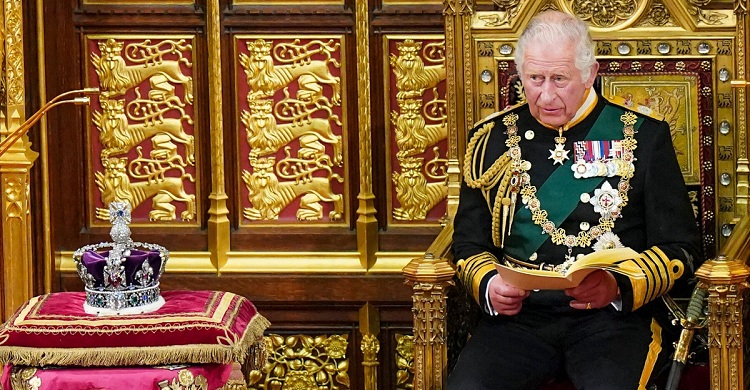
Charles III proclaimed as Britain’s king at tradition-steeped ceremony
Charles, who spent seven decades as heir apparent, automatically became king when his mother, Queen Elizabeth II, died on Thursday. But the accession ceremony was a key constitutional and ceremonial step in introducing the new monarch to the country, a relic of a time before mass communications.
Clerk of the Privy Council Richard Tilbrook proclaimed Charles “King, head of the Commonwealth, defender of the faith”, before declaring “God Save the King”.
Making his declaration, Charles III said: ‘My lords, ladies and gentlemen, it is my most sorrowful duty to announce to you the death of my beloved mother the Queen. I know how deeply you, the entire nation, and I think I may say the whole world, sympathise with me in the irreparable loss we’ve all suffered.
‘It is the greatest consolation to me to know the sympathy expressed by so many to my sister and brothers. And that such overwhelming affection and support should be extended to our whole family in our loss.’
They met without Charles, officially confirming his title, King Charles III. The king then joined them, vowing to follow his mother’s “inspiring example” as he took on the duties of monarch.
“I am deeply aware of this great inheritance and of the duties and heavy responsibilities of sovereignty which have now passed to me,” he said.
Speaking of his personal grief, he said: “I know how deeply you and the entire nation, and I think I may say the whole world, sympathize with me in this irreparable loss we have all suffered.”
The move means William’s wife Kate assumes the Princess of Wales title once held by his mother and Charles’ ex-wife, the late Princess Diana.




![[ID: fPc6IJYcdH8] Youtube Automatic](https://www.pbc24.com/wp-content/uploads/2025/02/id-fpc6ijycdh8-youtube-automatic-236x133.jpg)
![[ID: z3k2AHg5_Zg] Youtube Automatic](https://www.pbc24.com/wp-content/uploads/2025/02/id-z3k2ahg5zg-youtube-automatic-236x133.jpg)
![[ID: 1j3jGNx_5bY] Youtube Automatic](https://www.pbc24.com/wp-content/uploads/2025/02/id-1j3jgnx5by-youtube-automatic-236x133.jpg)
![[ID: 0dyoIblDZkE] Youtube Automatic](https://www.pbc24.com/wp-content/uploads/2025/02/id-0dyoibldzke-youtube-automatic-236x133.jpg)
![[ID: oR9ecw4dZIA] Youtube Automatic](https://www.pbc24.com/wp-content/uploads/2025/02/id-or9ecw4dzia-youtube-automatic-236x133.jpg)
![[ID: biI88IqpLjo] Youtube Automatic](https://www.pbc24.com/wp-content/uploads/2025/02/id-bii88iqpljo-youtube-automatic-236x133.jpg)
![[ID: UF_P5wfJzyQ] Youtube Automatic](https://www.pbc24.com/wp-content/uploads/2025/02/id-ufp5wfjzyq-youtube-automatic-236x133.jpg)
![[ID: XZXe6DqPsz8] Youtube Automatic](https://www.pbc24.com/wp-content/uploads/2025/02/id-xzxe6dqpsz8-youtube-automatic-236x133.jpg)
![[ID: XBKW_U1Ffpw] Youtube Automatic](https://www.pbc24.com/wp-content/uploads/2025/02/id-xbkwu1ffpw-youtube-automatic-236x133.jpg)
![[ID: Ik7SAqLvywA] Youtube Automatic](https://www.pbc24.com/wp-content/uploads/2025/02/id-ik7saqlvywa-youtube-automatic-236x133.jpg)
![[ID: 4O2E5mA9BHk] Youtube Automatic](https://www.pbc24.com/wp-content/uploads/2025/02/id-4o2e5ma9bhk-youtube-automatic-236x133.jpg)
![[ID: AIujgXX19OI] Youtube Automatic](https://www.pbc24.com/wp-content/uploads/2025/02/id-aiujgxx19oi-youtube-automatic-236x133.jpg)
![[ID: Ee6dMoOuFyk] Youtube Automatic](https://www.pbc24.com/wp-content/uploads/2025/02/id-ee6dmooufyk-youtube-automatic-236x133.jpg)
![[ID: oAxofH6D02Q] Youtube Automatic](https://www.pbc24.com/wp-content/uploads/2025/02/id-oaxofh6d02q-youtube-automatic-236x133.jpg)
![[ID: 3LgwCQL-b0g] Youtube Automatic](https://www.pbc24.com/wp-content/uploads/2025/02/id-3lgwcql-b0g-youtube-automatic-236x133.jpg)
![[ID: IthJ_EpYdu8] Youtube Automatic](https://www.pbc24.com/wp-content/uploads/2025/02/id-ithjepydu8-youtube-automatic-236x133.jpg)
![[ID: CFasqJHGS84] Youtube Automatic](https://www.pbc24.com/wp-content/uploads/2025/02/id-cfasqjhgs84-youtube-automatic-236x133.jpg)
![[ID: vTxEG601kqY] Youtube Automatic](https://www.pbc24.com/wp-content/uploads/2025/02/id-vtxeg601kqy-youtube-automatic-236x133.jpg)